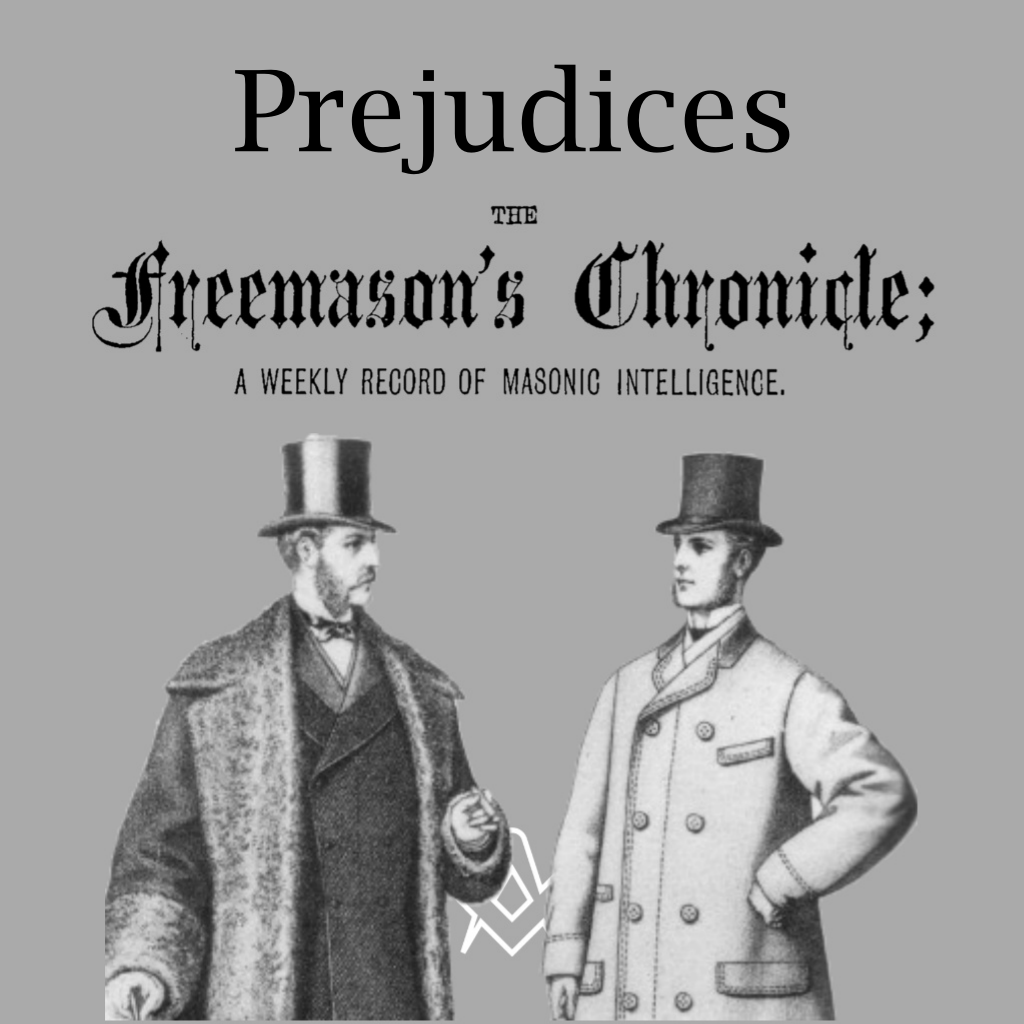Prejudices are partial judgments in favour of, or against certain persons or things, and, for convenience sake, may be ranged in two categories—those which are, comparatively speaking, harmless, and those which are harmful.
Under the former category we include those which, be they favourable or the reverse, people exhibit towards one of their fellows, for a particular line of conduct, the observance of certain customs, the adoption of certain theories, or the use of certain things.
Among the latter are numbered class or caste prejudices, as well as national, political, social, and religious prejudices.
As regards the former, they are, as we have said, for the most part in-nocuous.
We are prejudiced, for instance, against a person whom we know but slightly or not at all, because he is taciturn or loquacious, reserved or forward, or, in short, for any one or more of an infinite variety of reasons.
But accident brings us into closer acquaintance with him, and we find that his taciturnity is merely a natural and very proper reserve; his reserve, a native modesty, which for-bids him to be over curious about other people, or what concerns them; or his forwardness merely a kindly readiness to help whenever and whomsoever he can.
These prejudices, we say, are comparatively harmless, easily overcome by closer intercourse, or even if they are permitted to remain, the effect is trivial.
It is the other class of prejudice which is so offensive and so difficult to deal with.
These are scrupulously observed by some, by some even religiously worshipped, nor will any amount of sense, common or un-common, avail to overcome them.
Of course, those we exhibit towards others are perfectly orthodox, while those are heterodox which others exhibit towards us.
We cling like grim death to the former; no condemnation is strong enough for the latter.
Occasionally, when others prove loyal to the prejudices they have inherited or formed, we leaven our condemnation of their conduct with a certain amount of cynical good nature.
We call them deluded beings, more or less wilful, whom a little of our own enlightenment will soon undeceive.
But should they be bold enough to regard or describe us as deluded, we at once reject the imputation with the most intense scorn.
But to consider more minutely sundry of these more dangerous prejudices.
Nations, both in ancient and modern times, have often regarded each other with the bitterest prejudices.
No allowance is made for any differences of habit or of sentiment such as may be naturally engendered by differences of nationality.
Thus, for ages, and indeed till quite recently, all but a few enlightened Englishmen looked upon all Frenchmen as their natural foes, and Frenchmen were not behindhand in returning the compliment.
Had not Kings of England carried fire and sword through some of the finest provinces of France? Did they not owe their glory to the victories they had won over French armies? Did we not hold Calais for over two centuries, and when-ever a war prevailed in Europe in which France seemed disposed to take part, was it not our bounden duty as a nation to take the opposite side, the merits of the quarrel which had induced the war being a matter of secondary consideration altogether? We are wiser in this generation than we were formerly.
We fully believe it possible for England and France to co-exist without jealousy of each other’s fame and influence.
We find we can march together along the path of civilization; that, while one country may possess certain admirable qualities, the other also possesses certain other qualities equally admirable of their kind, we recognise that both nations have the good of humanity ever before them, though the means which each employs in promoting that good may vary considerably.
But it has taken us centuries to arrive at this knowledge, and it is sad to think how much blood and treasure has been expended ere the conviction dawned upon both that a hearty co-operation of the two peoples was more desirable than a constant antagonism, the result of mutual distrust and prejudice.
Then there is the prejudice of caste, exemplified often in the course of our history.
Many generations passed away before the Norman and the Saxon, the conqueror and the conquered became one people.
The former despised and the latter hated the other.
It was, of course, natural that at the outset the former should do their utmost to secure their conquest, and that the latter should eagerly seize every opportunity of throwing off the yolk.
But it was not till long after the Norman Henry I had set his subjects an excellent example, by marrying a Saxon Princess, that the two races found they could live together in peace and harmony; that each possessed many eminent qualities, and that together they would form a strong and powerful people, able to hold their own against even excessive odds.
The Cedric the Saxon, and Front-de-Boeufof Sir Walter Scott, are but typical of the caste feeling which long prevailed under the Norman and earlier Plantagenet sovereigns of England.
Class jealousies are similarly strong, and equally difficult to allay.
It may almost be said, indeed, that these rarely, if eyer, die out.
The aristocrat, in the common, not in the refined and proper sense of the word, looks down upon the hoi-polloi, the latter hate, if they do not fear the former.
There is no sort of sympathy between the two, and unhappily less now than formerly.
We are not speaking of the true aristocrat, the man of patrician birth and of exalted mind, who would forfeit his life ere he would be guilty of any petty vulgar act, or entertain any petty vulgar thought.
Nor have we in our mind the patrician by nature, who, though ignoble by birth, possesses a mind of the very highest order.
We refer, rather, to the ‘parvenu, the mushroom aristocrat, the man who is patrician in name perhaps, yet exhibits none of those grand and noble qualities we naturally associate with men in high places.
Numerous instances of such have we before us, of men who have thought themselves greater, the more they affected a lofty contempt for their inferiors in position.
It is these who perpetuate class prejudices, who widen more and more the gulf that separates the more fortunately from the less fortunately placed, and whose wilful perversity not seldom leads to a temporary subversion of the political and social status quo.
Then there is political, or, as we more commonly call it, party prejudice.
Conservatives and Radicals, the Right and the Left, alike believe that nothing good can emanate from their opponents.
A conservative must be inherently bad in the eyes of a radical; the right can do no good in the eyes of the left.
But all measures are not wholly bad, as all men are not wholly despicable.
The impartial, the unprejudiced man recognises this; the prejudiced ignore it.
Hence, often times, the course of politics is as proverbially unsmooth as the course of true love, and, worse still, there is no renewal of the old ties which bound men together in the earlier times their party politics were heard of.
Men serve their party as the rank and file of an army serve their general, with an abject obedience to all his commands, and with a genuine hostility to the foe.
This unreasoning obedience to the general, this stern hostility to the foe, are admirable qualities in the subordinate soldier, but in the party-man obedience is desirable, and hostile feeling towards the opposite party is uncalled for.
We may differ in politics without hating each other.
But the worst of all prejudices, infinitely more terrible in their consequences than all the national, political and social prejudices that have ever been exhibited are those originating in differences of religious faith.
All religions lay it down that men shall love each other, shall do their best to promote the common good.
But difference of creed, whether it be as wide as that which distinguishes Buddhism from Christianity, or merely sectarianism, invariably results in the most intense hatred.
That others may be influenced by conscientious motives seems incredible to the followers of this or that creed, the members of this or that sect.
The most terrible wars, whether internal or external, the most violent animosities, and those attended with the most fearful consequences, have been the outcome of religious prejudices.
In France, the wars of the League and the Massacre of St. Bartholomew’s, in Germany the terrible Thirty Years’ War, in the Netherlands the wars of Independence induced by Philip II.’s bigoted attachment to the Inquisition, at home the Smithfield Burnings, the Gunpowder Plot, the so-called Popish Plot in Charles II.’s reign, and the Gordon Riots, all these owed their origin to violent religions partiality for a particular form of Christian worship.
At the present moment the Pope himself, the head of Roman Catholicism, is illustrating his extreme bigotry by his condemnation of Freemasonry, on the ground that it recognises all religious faiths.
It is prejudiced in favour of no one creed, but leaves it to men to adopt that which they deem most worthy of belief.
The section of the Roman Catholic Church to which the Pope belongs denies to men their inherent right to honestly worship God according to the dictates of their own conscience.
We do not of course dwell upon this question, which has already attracted so much attention both here and abroad.
It shows, however, into what extremes prejudice will lead men who, in all other respects, are bent only on the most conscientious performance of their duties.
The point to which the foregoing remarks tend will probably have suggested itself long since to the minds of our readers.
It is the special aim of Freemasonry to over-come prejudice of every degree and kind, as far as possible.
Men of diverse views, both religious and political, meet together in the same Lodge.
All political and religious discussions are strictly forbidden, yet Masons are enjoined to be political so far as obedience to the laws of the country in ‘which they live is essential to the welfare of the body politic, and to be religions so far as it is the duty of every man to acknowledge one Supreme Being, the Creator of the Universe.
But apart from these general charges, none may be monarchical or republican, Christian or Mohammedan; so long as they are good citizens and worship God conscientiously, they are safe Masonic examples to take pattern by.
In a body of men thus constituted, we necessarily attain the minimum of prejudice.
As regards personal likes and dislikes, we are enjoined not to meet in the same Lodge any brother from whom we are, momentarily perhaps, estranged, but as regards the more dangerous class of prejudice, if the laws of Masonry are properly observed, there is no fear of any of those terrible dissensions breaking out which have so often endangered the progress and even the very existence of Christianity and other faiths.
 The Freemasons Chronicle, a weekly record of masonic intelligence, was first published 2nd January 1875 London, England as an independent weekly journal of masonic interest and continued for 27 years.
The Freemasons Chronicle, a weekly record of masonic intelligence, was first published 2nd January 1875 London, England as an independent weekly journal of masonic interest and continued for 27 years.
It should be the business of a journal devoted to the interests of the Order to attempt the removal of prejudices such as these, which, though they may have little perceptible influence upon the prosperity of the Fraternity, yet have the effect of preventing timid or ill-informed persons from enlisting under its banner.
It will not only attempt to keep pace with the growing literary requirements of the day, but it will seek to exhibit the Order to the non-Masonic world divested of its technical details, and clothed in the garb of Charity and Brotherly Love.
The questions of the hour, which exercise the minds of thoughtful men, will be handled freely and broadly, without any tinge of political or sectarian bias.
The memoranda of Masonic gatherings which will appear from week to week, will be full and accurate; and as free interchange of opinion is one of the best signs of life and vigour in any society, ample scope will be given for Correspondence on topics of interest to the Order.
If we may venture upon a new rendering of words which recent events have made memorable, we will say here, once and for all, that we will be keen men of business, and will spare no effort, consistent with honour, to achieve commercial success; but first, and before all things, we will prove to our brethren and the world that we are FREEMASONS.
Recent Articles: The Freemason's Chronicle
 Operative And Speculative Masonry Explore the fascinating transition from Operative to Speculative Masonry in our latest post. Discover historical insights from Augustus C. L. Arnold and Rev. Wm. P. Strickland, shedding light on Freemasonry's evolution and its enduring principles. Dive into the rich history and significant milestones that shaped modern Freemasonry. - The Freemason's Chronicle - 2 September 1876 |
 Discover the true essence of Freemasonry, an ancient order founded on the profound principles of love for God and man. It's a call to rise above mere appearances, to embody genuine virtue and benevolence, transcending societal pretense. Embrace the transformative power of simplicity, and let the authentic glories of Freemasonry inspire your path. |
 Discover the intriguing story of a man who became a Mason but openly professed his dislike for the institution. Unravel the peculiar circumstances that led him down this path and explore the unexpected consequences that followed. Dive into this thought-provoking account that challenges our notions of loyalty and reveals the complexities of human nature within the Masonic fraternity. |
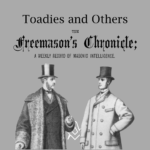 In the realm of Masonry, the principles of equality and respect are paramount. Yet, the presence of toadies—those who obsequiously seek favour from the influential—threatens these ideals. While Masonry embraces diverse beliefs and backgrounds, it rejects the sycophantic behaviours of toadies, flunkeys, and tuft-hunters, urging members to uphold genuine respect and self-worth. The Freemason's Chronicle - 22nd January 1876 |
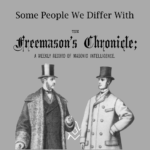 Unveiling the Unpleasant: Some People We Differ With Discover the intriguing dynamics of quarrels within the Masonic brotherhood. From the cantankerous to the litigious, the peevish to the vengeful, delve into the characters that challenge fraternal harmony. Explore their motives, temperaments, and the art of navigating disputes with these fascinating brethren. Brace yourself for a riveting journey into the world of conflicting personalities. |
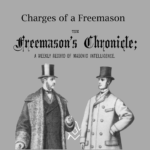 Unravelling the Masonic Mystique: A Deep Dive into the Freemasons' Charges - Explore the intricate world of Freemasonry, its principles, rituals, and the mechanisms for resolving internal disputes. Discover how this ancient fraternity fosters unity, promotes moral conduct, and upholds the sanctity of its secrets, while navigating the complexities of modern society. - The Freemason's Chronicle - 4 December 1875 |
 Unlock the hidden lessons of Masonic Studies! Don't settle for superficial knowledge or mere rituals. Discover the true depth and meaning behind Freemasonry. Expand your understanding of Tracing-Boards, Lectures, and more. Join regular Lodges of Instruction to enhance your Masonic journey. Become a knowledgeable Freemason, not just a token-bearer. Unleash the power of true Masonic wisdom today! |
 Uncover the incredible story of how Masonry saved the life of a Crimean War foot soldier in this historical and masonic account. Through the first hand experience of a soldier engaged in fierce hand-to-hand combat, witness the fateful encounter with a Russian Freemason that changed the course of his life. Learn how brotherhood and a deep dedication to the craft can lead to unforeseen and life-saving circumstances on the battlefield. |
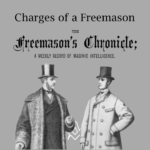 The Freemason's Chronicle - Charges of a Freemason The secrets of Masonry are the exclusive property of the Craft, and can never be communicated to one who is a mere labourer and not an accepted Mason. Hence, no labourer, that is, one who has not been regularly initiated in a legal Lodge. Article first published in The Freemason's Chronicle, 27 November 1875 |
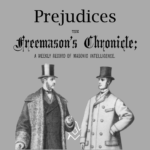 The Freemason's Chronicle - Prejudices Prejudices are partial judgments in favour of, or against certain persons or things, and, for convenience sake, may be ranged in two categories—those which are, comparatively speaking, harmless, and those which are harmful. Article first published in The Freemason's Chronicle, Oct. 2 1875. |
 The Freemason's Chronicle - Cliques Is Freemasonry - a Clique ? Man has been defined as a gregarious animal, but in his highly civilised condition he is gregarious only to a limited extent. First published in The Freemason's Chronicle, Oct. 2 1875, addresses the same challenges then as now. |
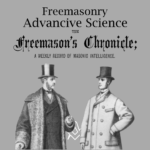 The Freemason's Chronicle - Freemasonry - an Advancive Science Is Freemasonry - an Advancive Science ? Not to confuse advancement with innovation. Has it been the case that Freemasonry's survival for 300 years plus is due to being an Advancive Science, tending to advance. First published in The Freemason's Chronicle 18 September 1875, addresses the same challenges then as now. |
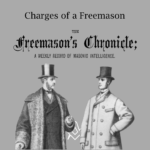 The Freemason's Chronicle - Charges Of A Freemason An interpretation of the "Charges of a Freemason", written Bro. Cornelius Moore and published in 1875, that introduce certain opinions that for some readers, will not sit well in contemporary times. - The Freemason's Chronicle, Sept. 11, 1875 |
 On The Order Of The Temple And Its Doctrine. THE Order of the Temple is divided into two great classes, denominated respectively the Order of the Temple and the Eastern Order. The Eastern Order gave birth to the Order of the Temple, and in the course of time has become an appendage of the latter. It is in ancient Egypt that we find the cradle of the Eastern Order. The Freemason's Chronicle, Sept. 4, 1875 |
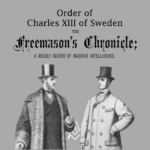 Order of Charles XIII of Sweden The following translation of the Manifesto of King JL Charles XIII of Sweden, on the occasion of his establishing the Masonic Order which bears his name, and of the Statutes of the said Order, may be interesting to our readers. The Freemason's Chronicle, Aug. 28, 1875 |
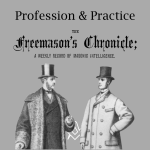 Most of our readers in the course of their experience, have doubtless met with enthusiastic brethren who take it for granted that a Mason can do no wrong. These enthusiasts are thoroughly convinced that the vast majority of those who join the Order are the most benevolent, the most moral, and the very noblest members of society. - The Freemason's Chronicle 10 July 1875 |
 An article investigating the relationship between masonry and citizenship. Are the principles of Freemasonry aligned with the freemason's claim to be a better citizen of the world? The Freemason's Chronicle - 19 June 1875 |
 A visitor must make clear his identity to the satisfaction of the Lodge he proposes to visit. More than once have we been asked to explain our views as to the reception of strangers in a Lodge. - The Freemason's Chronicle - 29 May 1875 |
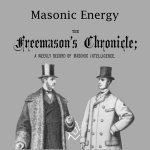 Is there reason in the accusation that Masonic energy looks only to a course of good feeds, when we can point to such grand results as have been achieved in these latter years, both in respect of the extension of our Order ? - 1May 1875 |
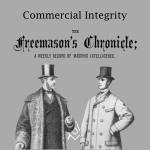 Implementing Freemasonry's peculiar system of morality in our day to day business affairs was the topic of this article, Commercial Integrity, first published in The Freemason's Chronicle - 8 May 1875 |
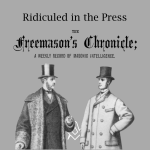 Ridicule has been somewhat illogically described as the test of truth. If it were so, Freemasonry ought to have perished long since. Two press reports from May 1875 covering the |
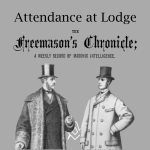 There are many things which Freemasonry will do for a man in the way of opening his mind and giving him larger and kindlier views of life, but Freemasonry itself, cannot eradicate the natural bias of the disposition. |
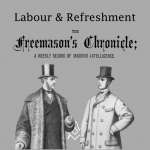 There is, we fear, too marked a tendency in very many Lodges to hasten through its labours, with a view to entering, as soon as possible, upon the business of refreshment. - The Freemason's Chronicle 17th April, 1875 |
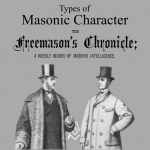 Another example that demonstrates that nothing really changes in Freemasonry. In an article the Types of Masonic Character published 145 years ago in The Freemason's Chronicle 10th April, 1875 |
 A brief history on the relationship between the British Monarchy and the craft - The Freemason's Chronicle 20th March , 1875 |
 What are the qualities of a convivial man and how does this dovetail perfectly in to Freemasonry ? 16th March, 1875 |
 A review of the "Sketch for the History of the Dionysian Artificers," a fragment, by Hyppoli to Joseph Da Costa - This little work may be regarded as, so to speak, the Holy Grail of Masonry. |
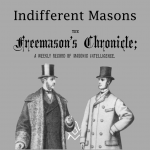 Nothing really changes, an article Indifferent Masons, From Le Monde Maçonnique 1874. Translation published in The Freemason's Chronicle 20th February, 1875 |
 In handling an intruder in the lodge, we endeavoured to show that a good Mason should be a gentleman, and a sincere man. The Freemason's Chronicle 20th February, 1875 |
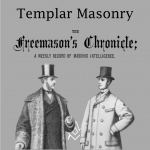 Templar Masonry - a historical aspect of the Religious and Military Order of the Temple published in The Freemason's Chronicle 13th February, 1875 |
 Secrecy perhaps the strongest objection urged by the enemies of the Masonic Order against its existence published in The Freemason's Chronicle 20th March 1875 |
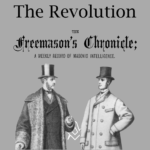 Freemasonry In The United States during And After The Revolution We take a look at Freemasonry in the United States during and after the Revolution first published in The Freemason's Chronicle - February 6, 1875 |
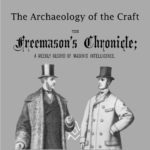 We take a look at the archaeological connection with the Craft, first published in The Freemason's Chronicle - January 30, 1875 |
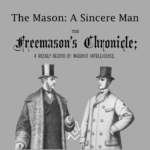 What it means to a Freemason to be a sincere man. Extract: first published in The Freemason's Chronicle - January 23, 1875 |
 What it means to a Freemason to be a citizen of the world ? First published in The Freemason's Chronicle - January 16, 1875 |
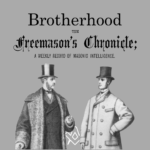 Brotherhood! In that one word what sympathetic associations arise. First published in The Freemason's Chronicle - January 9, 1875 |
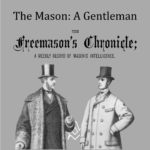 This opening article was written 145 years ago, yet it resonates with Freemasons today as it did then. First published in The Freemason's Chronicle, January 2, 1875, Issue 1 |
masonic knowledge
to be a better citizen of the world
share the square with two brothers

click image to open email app on mobile device


